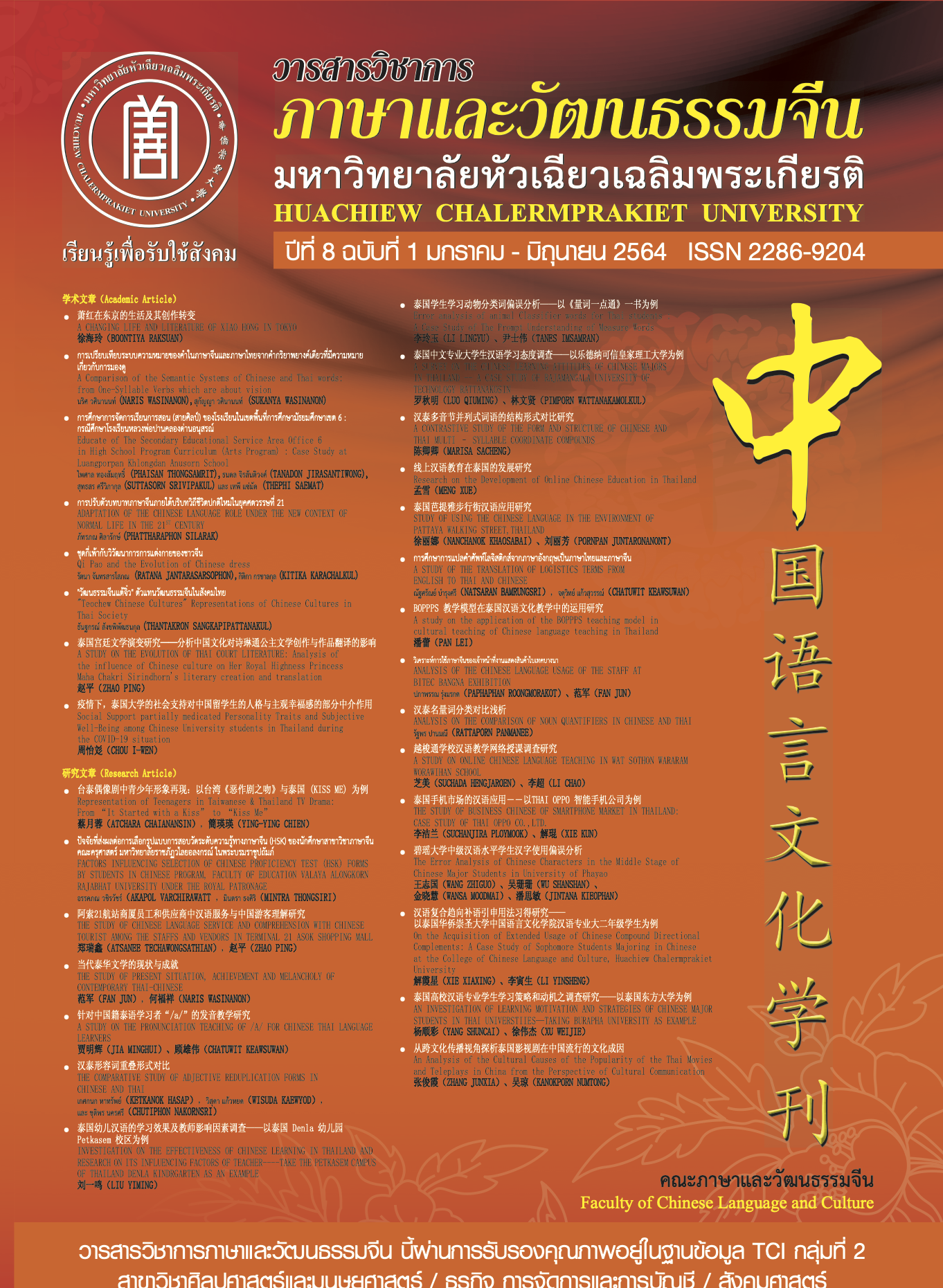An AN INVESTIGATION OF LEARNING MOTIVATION AND STRATEGIES OF CHINESE MAJOR STUDENTS IN THAI UNIVERSTIIES---TAKING BURAPHA UNIVERSITY AS EXAMPLE
Keywords:
Universities of Thailand, Learning Motivation, Learning Strategies, Correlation, Chinese major as a Second LanguageAbstract
Motivation is one of the most important determinants of second language learner, while strategies are the methods that language learners choose to use for gaining more knowledge. This study divides Learning Motivation into Integrative Motivation, Instrumental Motivation, Achievement Needs, Result Attribution and Learning Environment, and Learning Strategies are divided into Memory, Cognition, Compensation, Metacognitive, Affective and Social strategies. This study uses questionnaire surveys, in-depth interviews and classroom observations to survey 163 Chinese major students at the Faculty of Humanities and Social Sciences, Burapha University, Thailand. Research shows that students have the strongest motivation in Integrative and Instrumental Motivation, and the weakest is Result Attributable Motivation. Gender, Chinese proficiency, family background and learning time are not significantly related to Learning Motivation, but grade is significantly related to Learning Motivation. Meanwhile, Metacognitive Strategy is the most popular strategy, well Memory strategy is the least frequently to use. There is no obvious connection between study time, family background, gender, and study strategy, which are mainly affected by Chinese proficiency and grade factors. At the same time, it is found that there is no significant correlation between Learning Motivation and Learning Strategies in Chinese Major students. Finally, base on this result, suggestions for Chinese teaching are proposed.
References
Dornyei, Z. Motivation in second and foreign language learning[J]. Language Learning, 1998, 31(3): 118.
Dornyei, Z.Motivation and motivating in the foreign language classroom.Modern Language Journal. 78/ 3:273-284.1994.
Gardner,R.C.Social psychology and second language learning-the role of attitudes and motivation[M].London:Edward Amold,1985.
Gardner, R.& Lambert, W.Attitudes and Motivation in Second Language Learning.Rowley, Mass:Newbury House, 1972
Orawee Pannak. Language Learning Strategies Used by First Students at Thaksin University, Songkhla Campus,Thailand{D}. Songkhla: Thaksin University, 2014.
Oxford.Use of Language Learning Strategies: A Synthesis of Studies with Implications for
Strategy Training.System.1990.17 (2):234-247.
Trambley, P. E. and R. C. Gardner, Expanding the motivation construct in language learning. Modern Language Journal, 79.1995
于小雨.来华泰国政府官员汉语学习策略调查与分析[J].华侨大学学报(哲学社会科学版),2020 (04):53-62.
王婉莹.大学非专业学生日语学习动机类型与动机强度的定量研究[J].日语学习与研究2006(3):
-46.
文秋芳.英语学习者动机、观念、策略的变化规律与特点[J].外语教学与研究(外国语言双月
刊),2001(2):105-110.
文秋芳、王立非. 中国英语学习策略实证研究20年[J]. 外语语言文学,2004(1):39-45.
文秋芳、王立非. 影响外语学习策略系统运行的各种因素评论[J]. 外语与外语教学,2004(9):28-
吕军伟、钟杏梅. 近二十年来泰国学生汉语学习动机研究现状及问题分析[J]. 东南亚纵横,
(5): 73-78.
刘丹丹. 中国英语学习者的阅读策略研究[J]. 外语界, 2002(6):13-18.
刘霜.泰国学生汉语学习动机调查研究—以泰国勿洞为例[D].重庆:重庆大学,2012.
许淼. 泰北高校华裔学生汉语学习现状研究—从学习动机和学习策略角度考察[D].武汉:华中科技
大学, 2011.
吴琼.基于非洲来华留学生汉语学习策略的口语教学研究[J].语言应用研究,2017:117-120.
吴勇毅.不同环境下的外国人学习汉语策略研究[D],上海:上海师范大学, 2007.
沈亚丽. 来华留学生汉语学习动机与学习策略及其相关性研究[D].上海:上海交通大学,2009.
郑立华.法语专业学生学习动机调查分析[J].现代外语,1987(1):56-65.
郑亚萍. 非目的语环境下泰国高中生汉语学习策略调查研究——以泰国罗勇中学孔子课堂为例[D].
广州:暨南大学, 2014.
夏文君.来华学生学习动机多维度探究[J].大学语文建设,2020(15):68-70.
秦晓睛、文秋芳.非英语专业大学生学习动机的内在结构[J].外语教学与研究,2002.34(1):
-58.
秦晓晴.第二语言学习动机研究及其存在的问题[J]. 外语教学, 2003(3): 16-19.
倪清泉.大学英语学习动机、学习策略与自主学习能力的相关性实证研究[J].外语界,2010(2):
-35,79.
蒋祖康.学习策略与听力的关系——中国英语本科学生素质调查分报告之一[J].语教学与研
究.1994(1):51-58.
魏亚萍.泰国东北部汉语学习者学习动机与学习策略个体差异研究[D].兰州:兰州交通大学,2019.
百度文库: https://wenku.baidu.com/view/ee66c62158fb770bf78a5528.html,2012-02-04.
问卷网: https://www.wenjuan.com/lib_detail_full/5566e41bf7405b3f9499f065
Downloads
Published
How to Cite
Issue
Section
License
บทความที่ได้รับการตีพิมพ์เป็นลิขสิทธิ์ของวารสารภาษาและวัฒนธรรมจีน มหาวิทยาลัยหัวเฉียวเฉลิมพระเกียรติ
บทความใน “วารสารวิชาการภาษาและวัฒนธรรมจีน” เป็นทรรศนะของผู้เขียนโดยเฉพาะ กองบรรณาธิการไม่มีส่วนในความคิดเห็นในข้อเขียนเหล่านั้น




